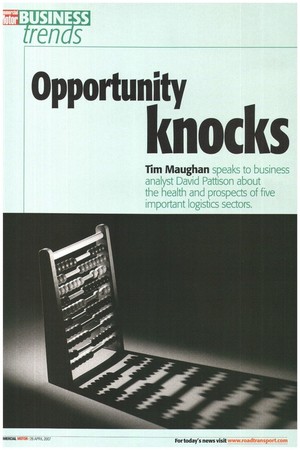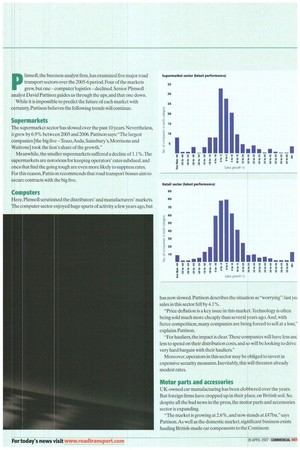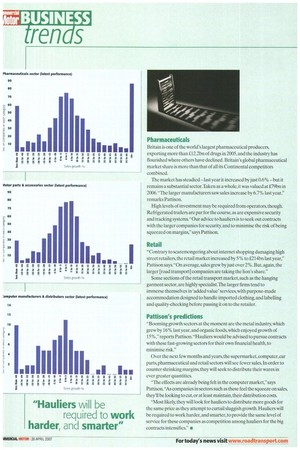Opportunity
Page 54

Page 55

Page 56

If you've noticed an error in this article please click here to report it so we can fix it.
knocks
urn Maughan speaks to business
analyst David Pattison about the health and prospects of five important logistics sectors.
palyslimsoll, the business analyst firm,has examined five major road itransport sectors over the 2005-6 period. Four of the markets grew, but one — computer logistics — declined. Senior Plimsoll t David Pattison guides us through the ups, and that one down.
While it is impossible to predict the future of each market with c rtainty, Pattison believes the following trends will continue.
5 permarkets
The supermarket sector has slowed over the past 10 years. Nevertheless, it grew by 6.9% between 2005 and 2006. Pattison says: "The largest companies [the big five —Tesco,Ascla,Sainsbury's,Morrisons and Waitrose] took the lion's share of the growth."
Meanwhile, the smaller supermarkets suffered a decline of 1.1 %.The supermarkets are notorious for keeping operators' rates subdued, and ones that find the going tough are even more likely to suppress rates. For this reason, Pattison recommends that road transport bosses aim to secure contracts with the big five.
omputers
Here. Plimsoll scrutinised the distributors' and manufacturers' markets. The computer sector enjoyed huge spurts of activity a few years ago, but has now slowed. Pattison describes the situation as "worrying": last ye; sales in this sector fell by 4.1%.
"Price deflation is a key issue in this market.Technology is often being sold much more cheaply than several years ago. And, with fierce competition, many companies are being forced to sell at a loss,' explains Pattison.
"For hauliers, the impact is clear.These companies will have less an less to spend on their distribution costs, and so will be looking to drive very hard bargain with their hauliers."
Moreover, operators in this sector may be obliged to invest in expensive security measures. Inevitably, this will threaten already modest rates.
Motor parts and accessories
UK-owned car manufacturing has been clobbered over the years. But foreign firms have cropped up in their place, on British soil. So, despite all the bad news in the press, the motor parts and accessories sector is expanding.
"The market is growing at 2.6%. and now stands at £47bn," says Pattison. As well as the domestic market, significant business exists hauling British-made car components to the Continent.
Pharmaceuticals
Britain is one of the world's largest pharmaceutical producers, exporting more than L12.2bn of drugs in 2005, and the industry has flourished where others have declined. Britain's global pharmaceutical market share is more than that of all its Continental competitors combined.
The market has steadied last year it increased by just 0.6% but it remains a substantial sector.Taken as a whole, it was valued at I:79bn in 2006. "The larger manufacturers saw sales increase by 6.7% last year," remarks Pattison.
High levels of investment may be required from operators, though. Refrigerated trailers are par for the course,as are expensive security and tracking systems. "Our advice to hauliers is to seek out contracts with the larger companies for security, and to minimise the risk of being squeezed on margins," says Pattison.
Retail
"Contrary to scarernongering about internet shopping damaging high street retailers, the retail market increased by 5% to f214bri last year," Pattison says."On average, sales grew by just over 2%. But, again, the larger [road transport] companies are taking the lion's share."
Some sections of the retail transport market, such as the hanging garment sector, are highly specialist.The larger firms tend to immerse themselves in 'added value' services, with purpose-made accommodation designed to handle imported clothing, and labelling and quality-checking before passing it on to the retailer.
Pattison's predictions
"Booming growth sectors at the moment are the metal industry, which grew by 16% last year, and organic foods, which enjoyed growth of 15%," reports Pattison."Hauliers would be advised to pursue contracts with these fast-growing sectors for their own financial health, to minimise risk."
Over the next few months and years, the supermarket,computer, car parts, pharmaceutical and retail sectors will see fewer sales. In order to counter shrinking margins, they will seek to distribute their wares in ever greater quantities.
"The effects are already being felt in the computer market," says Pattisort."As companies in sectors such as these feel the squeeze on sales, they'll be looking to cut,or at least maintain,their distribution costs.
"Most likely, they will look for hauliers to distribute more goods for the same price as they attempt to curtail sluggish growth. Hauliers will be required to work harder, and smarter, to provide the same level of service for these companies as competition among hauliers for the big contracts intensifies."






















































































































































































